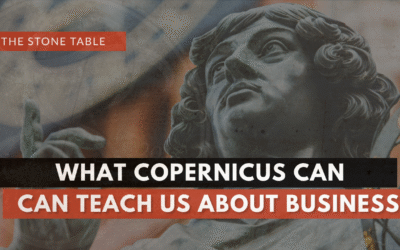Workism and Worship: A Student’s Perspective
![BOOKLAUNCH 4 [Recovered]-43](https://www.thestonetable.org/wp-content/uploads/2021/09/BOOKLAUNCH-4-Recovered-43-e1632436585419.png)
Preunderstanding: What is Workism?
Workism is “the belief that work is not only necessary to economic production, but also the centerpiece of one’s identity and life’s purpose; and the belief that any policy to promote human welfare must always encourage more work.”1
Sounds refreshing, doesn’t it? My work being the centerpiece of my identity. That would be easy – I could be pastor, writer, student, entrepreneur, business leader, or boyfriend.
Mmm, empowering.
But what am I empowering?
A New Way to Worship
We all love new things. That’s why there are so many people hopping on the bandwagon for the iPhone 13; even the ones that just bought the iPhone 12 last year. Think about that, though. How crazy is that? That’s like another $1000 for a phone that you just got last year.
So, why do we do this? Why are we so obsessed with new things? I believe it is because we are a country built on consumerism, which is a fancy economic word for saying that we believe our well-being comes from buying things, and I think consumerism set the stage for us to worship by workism.
From birth, we are raised in an economic world fueled by the needs, or the perceived needs, of the consumer. The marketing companies target the consumer’s identity to make them feel as though they are lacking something. But by buying [into] their product, their identity is redeemed. However, there will always be a new advertisement – a new product. Therefore, consumerism is an act of worship. We ascribe power to products and chase them down to fulfill the void in our identity.
Workism is worship, and worship is power. Whatever is worshipped is ascribed (or given) power over those that worship it. God created people and called them to worship Him in return. Satan tried to take that worship for himself, having been prideful enough to weigh his own value higher than the God that created him. The emperors of Babylon, Rome, and many other renowned societies deemed political worship a part of the duty of their citizens. In Roman society, if you didn’t worship the Roman emperor, you were considered unpatriotic and an enemy of Rome.
See, the emperors knew something of God, but did not know God. They knew that worship was power, and that by taking it, they would be made powerful in the eyes of the people. They practiced a form of workism – they let their job in political power become the sole purpose of their existence.
Worship is holding something above ourselves. It is subjecting ourselves to be identified by its “power”.
What do we give power to with our worship today?
Workism says that we want our identity placed in our careers. Workism says that we worship our work as our source of identity, when really our work is meant to come from our source of identity.
Here in the US, we have the freedom to worship as we please – it’s built right into our Constitution. We worship Christ, Buddha, Allah, Hindu gods & goddesses, our political parties, our own selves, our money, our homes, etc. We have that kind of freedom here in the US to do so. So, we do.
Any good investor would tell you not to invest in something that cannot offer a return. These shrewd professionals are insistent on viewing the “long run” and waiting to see an investment come back better in the future.
Yet, we invest the power of our identity into markets that only have the capability to depreciate that investment.
Why?
Society
Society plays a pivotal role in this mix. Workism is a socially approved method of self-identification and worship. It is something that is practiced in an increasing measure and has found great favor by US constituents in how much we value “being busy”.
Whether that’s the local pastor being busy with writing sermons, counseling congregants, and organizing activities, or the CEO of a big corporation setting up their sales meetings, board reviews, and new ventures, we are all guilty on some level of committing this form of idolatry found in workism.
Simply put, it can sound like this: “If I’m not busy, I’m not important”. Or “I am important because I am busy”. This can be a form of workism.
I, as a college student, can easily fall into this subtle form of idolatry. For example, I have committed my education to God as an act of worship – therefore, I strive to excel in my studies for God’s glory. Yet, if I become fixated on my achievement, say, getting a 4.0 GPA, and I don’t remain grounded in loving God as my foundation, I have let myself stray into the realm of idolatry, and a form of workism. See, it’s about my attention – my worship. Who is getting it – God or my GPA?
This does not mean that we cannot strive to be excellent in all that we do. I think we should, truly, but we are called to remain with certain priorities above others. If the football game is on, but your wife hasn’t seen you in three days because of a work trip, how are you going to spend the afternoon? There is a priority that stands out there for the sake of your marriage covenant. In a similar way, though far more powerful & implicatory, God is meant to remain at the top of our own priorities; to be the number one receiver of our attention (i.e., worship).
God created the flow of work as worship in the original order – just after He created man & woman, He blessed them and told them to
“Be fruitful and multiply and fill the earth and subdue it…” (Genesis 1:28).
And
“The LORD God took the man and put him in the garden of Eden to work it and keep it.” (Genesis 2:15).
This is how God created work in the original order. He did not create work to be worshipped, He created work to be a form of worship. This is what I strive to do as a student – worship God in my work.
When we get this mixed up as a society, we cut out the one who made work, and then deem ourselves & our identity to be subject to our work. This is contrary to the fulfillment that God intended us to have.
Culmination
We need stability. We need something that we can grasp that is unchanging throughout time. We cannot allow ourselves to be tossed around like leaves in the wind every time that a changing season approaches. Our identity isn’t rooted in the leaves – it’s rooted in the tree.
Nobody is moving the tree anytime soon. When we are worshipping our work through workism, we are putting our whole identity into one leaf – something on the edge of the surface of our being. We are created to be something so much more than that. We are a wonderful sapling, not just a leaf.
There is something that never changes. Someone that never changes. The Bible says that “Jesus Christ is the same yesterday and today and forever.” (Hebrews 13:8). That means that He doesn’t change. He is the same Messiah He was in Bible times – the same Savior & Redeemer of mankind, the world, and our work as He was at the time of the Gospel stories. He came to reset the order.
We got lost in our work, but He came to return us to the order that God created. The original order has been restored, and we are free to worship Him through work once more.
This is the tree. This is the foundation that doesn’t move; the foundation that gives you the freedom to move with the wind, not be swept away by it.
Conclusion
By now, I hope that I’ve established the clear connection between our work and our worship – how God created work to be an act of worship and how our modern workism has deviated that from its original intention. By being aware of this new paradigm in the workplace, and at home, we are now able to effectively strive against it and restore the order to the way we were intended to work.
1 Derek Thompson, The Atlantic, 2/24/19. Emphasis mine.






